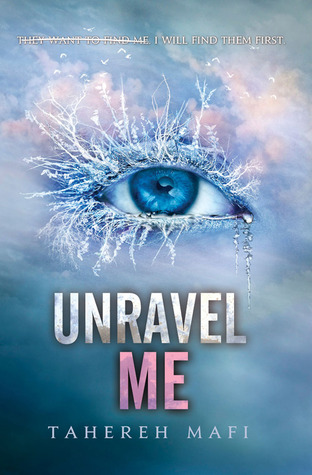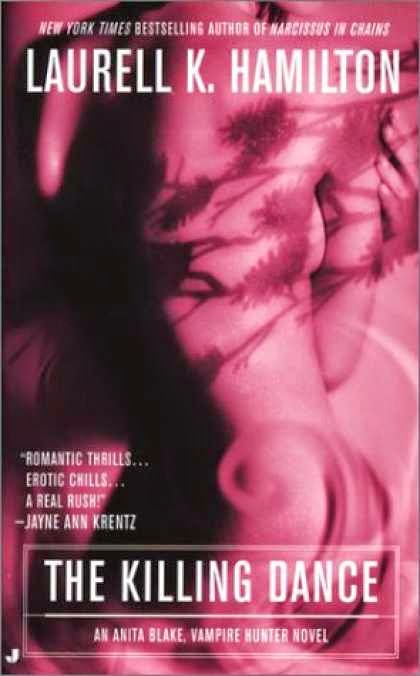A couple of days ago, I saw a tag-video by ChapterStackss and LukeLaneReads about NSFW-books. Because it seemed a fun idea and I have read some NSFW-stuff in the past - and still got a load of them on my TBR - I went ahead and answered the ten questions myself. If you read ahead, please consider this a warning cause there is some very mature content coming up!
1. What is the LAST book you would want your parents to walk in on you reading?
I'd say this will have to be either a Laurell K. Hamilton book or a Highlander novel by Karen Marie Moning (*). If titles like Narcissus In Chains, Incubus Dreams or Kiss Of The Highlander aren't enough of a reason to not make your parents see you reading those books, the covers seem to match the content quite a bit.
2. It’s storming outside, and you’re home alone for the night. What book would only make matters worse?
The first was Harry Potter & The Goblet Of Fire by J.K. Rowling. The graveyard-scene at the end really freaked me out when I read it the first time. I was twelve back in the days and Lord Voldemort did scare me a bit.
Another scary read was Mo Hayder's Ritual. It featured a creature from African legends and the atmosphere of the book was so tense every single sound around me made my heartrate go up. I even remember peeking above the book to make sure that the creature wasn't lurking somewhere in the shadows. Thanks Mo, I didn't sleep well that night!
3. Have you ever read a book simply because of the controversy surrounding it?
I have not, as far as I can remember. But I guess that I will, perhaps, maybe, someday, read Fifty Shades.
4. What is the most cringe-inducing romance or sex scene you have ever read?
If you had asked me this question two months earlier, I would have probably mentioned Laurell K. Hamilton. We're not, however, two months earlier, so Tahereh Mafi's Unravel Me (**) gets to get the honors. I'm fine with mature content, but Juliette and Adam and Juliette and Warner made me cringe so much. Every other thoughts when they were together was about Juliette wanting to touch, ravish, lick and kiss every single inch of his body - didn't matter whether is was Adam or Warner. Reading a horny teen's thoughts is just plain awkward. The almost-sex scene at the end of the book was also very cringe-worthy and awkward.
While Hamilton tends to go over the top at times, I actually prefer her because she doesn't pretend and just goes for it. Not this very weird and awkward horny stuff.
5. What book has made you question the author's sanity?
Near the end of the book, when Kahlan goes into the Con Dar, she does some things to Denim Nass, which provided some extra scarring on my soul.
These books are not for the kids!
6. Have you ever put down a book and not finished it because the content was too much for you?
No. I've never put a book down for reasons like this. Cause I'm tough and all that.
7. What fictional character do you have the most NSFW thoughts about?
7. What fictional character do you have the most NSFW thoughts about?
I'm not one to swoon over a fictional character, but after seeing Game of Thrones, I have the odd NSFW thought about Robb Stark.
8. Show us your most NSFW book cover.
No text needed, I presume. Also, I'd like to point out that the Hamilton one is Not Safe For Anywhere But Your Home. I've read this on the train, and the painfully bright pink cover with the nude woman attracts attention and people tend to look weird.
9. Have you ever read something from the erotica/romance genre, and what did you think?
I've yet to read a downright erotica/romance novel. Up till now, the closest I've been to the genre has been paranormal romance. If I'm in the right mood, I kind of like them. They're far from good novels, but they're good entertainment and I can appreciate them for being simply that and not pretending to be otherwise.
10. You stumble across a portkey. What fictional world would you not want to be transported into?
From what I've already read, I'm dreading to be transported to any Stephen King-universe. I think that in every single story of his, I'll be one of the first to go.
(photo credits Geekologie)
(*) Fifty Shades Of Grey is also a perfectly sound answer to this question, but I took it upon myself not to answer every single question with that book.
(**) I will post my review to this and the previous book, Shatter Me, soon-ish.












